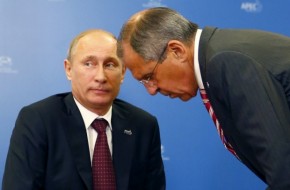
Posts last days of Russian-Japanese relations give the impression of a controversial assessment of them by the diplomats. So, eg, Russian Foreign Ministry said "the positive dynamics of cooperation" during the next round of Russian-Japanese strategic dialogue at the level of first deputy ministers.
In a statement on the ministry website states, that "the sides discussed issues of bilateral relations, including a schedule of political dialogue ". Granted, that some convergence of views has been achieved on international issues, but not on the "main" for the Japanese question - Regional, that is, the satisfaction of their unfounded claims on Russian land - Kuril Islands.
On such an assessment suggests an official report:
"A thorough exchange of views on important regional and global issues, including arms control topics, the evolution of the situation in Europe, Asia-Pacific region, settlement in the Middle East, the situation on the Korean Peninsula and in South Asia, Ukrainian domestic conflict ". And not a word of Russian-Japanese "Peace Treaty", It has long become a euphemism for "territorial issue".
Explanations may be two. The first - at the meeting of first deputy "territorial issue" Ministers seriously discussed.
And the second - hand continue to follow the agreement "classify" all, with regard to the negotiations on the fate of the Kuril Islands and the people living on them.
Despite the absurdity of the "secret diplomacy" in the XXI century and the biblical truth about, that "all the secret sooner or later becomes apparent", Japanese diplomats want to administer their own affairs in the silence, behind closed cabinet doors.
However, the real political life is not subject to the concealment and breaks out. the, that the negotiations on the Kuril Islands stalled and stalled seriously, obviously. Hence the anger and dissatisfaction of Tokyo, which obviously throws over Moscow 'protests', Using the slightest occasion to declare his "disagreement" with the sovereignty of Russia in the Kuril Islands. Whatever made the military a few islands to practice skills, immediately sent to the Russian Foreign Ministry, "a diplomatic protest".
And, looks like, Japanese diplomatic office, not wanting to aggravate relations to the extreme, It gives these "protests" a sort of routine nature, showing, It is making it as if by inertia, as we say, "for check". And so assigned to the employee of the Japanese Embassy in Moscow, middle managers' report about the protest "over the phone. what, of course, It goes beyond the established protocol, when the real diplomatic protest shall be in the form of notes, which is transferred or handed over to the Japanese ambassador was summoned to the Japanese Foreign Ministry, Ambassador Russia.
Smolensk Square decided to put an end to it and notified the Japanese side, that such "telephone discontent" will not continue to take.
One could go further and say the refusal to take any at all whatsoever "protests" about what is happening in the Kuriles events and activities.
Obviously a provocative and aimed at "finding a compromise" on the talks deeds of the Japanese government should also include the recent decision to include in the Japanese textbooks for primary schools, ie for young children, "Explanation of primordial affiliation northern territories (southern Kuriles) Japan ". The provocation could not remain unanswered. Head of the Information Department of the Russian Foreign Ministry Maria Zakharova reacted rather harshly, but rightly:
"We have taken note published by the Ministry of Education, culture, sport, Science and Technology of Japan press release on the introduction of a 2020 , the new edition of textbooks for elementary school, which uses absurd formulation of the "primordial affiliation" Southern Kuril Islands of Japan. We see this as another step of the official Tokyo, propaganda aimed at promotion of its well-known position on the peace treaty, directly contrary to the generally accepted assessment of the outcome of the Second World War. These actions of the Japanese side, which are contrary to the set high-level task build mutual trust, regrettable. Particularly disappointing circumstance, the Japanese side creates a distorted view of the historical and legal realities in the younger generation of the country, mortgaging the future of grain alienation between the peoples of neighboring countries ". In this case, the director of the Foreign Ministry Department of reasonable notice, that "it would be better expanded (textbooks) chapters on Hiroshima and Nagasaki, for Japanese children do not know about, who carried out the bombing ".
Due to the hostile attacks of Japanese politicians, their unwillingness to build a relationship based on Russian interests clearly and fundamentally sound assessment of the prospects of finding some "mutually acceptable compromise" on the Kuril Islands, Giving Russian Foreign Minister Sergei Lavrov. It is fully manifested in his answers to questions requesting an interview with a correspondent of the newspaper "Moskovsky Komsomolets". Minister directly, often occurring without diplomatic flair have, that "to talk about, that relations between Moscow and Tokyo are ripe to solve complex problems on the peace treaty, it is too early". and explained, not only to Russian readers, but also, as they say in diplomacy, Japanese partners are Russia's position:
"Is always, when a neighbor, Japan and our very important neighbor, He wants to move ahead on this or that issue forward, and you have on this issue diametrically opposed positions, speak still need. And we try to talk to the argument based on, which the, in my opinion, is the undisputed ".
In this position of principle was repeated that, that to talk about any new agreements "need based on respect for the UN Charter, fixing as immutable results of the Second World War ".
But this something to do in Tokyo do not wish to, For claim directly, they do not recognize Russian sovereignty over the South Kuril Islands.
This is the official statement of the problem. And supported by influential political forces and big capital nationalist forces of the country do not recognize Russian sovereignty, and to all the Kurils and southern half of Sakhalin. Recall, that one of the numerous and active organizations of these forces "Nippon kaigi" ("The Japanese Congress") led by none other than, Prime Minister of Japan Shinzo Abe.
That reluctance of the Japanese government to acknowledge the realities of the post-war territorial Lavrov rightly calls the main obstacle, do not allow to conclude between the two countries comprehensive treaty.
"Here we have a stone of stumbling, - says Minister. - It is an indispensable first step in the work on peace treaty, as it is called Japanese (we would have called it wider), but Japanese colleagues categorically do not want to make such recognition. With regard to the Peace Treaty, in their understanding, as shown by my repeated talks with Japanese Foreign Minister Taro Kono, Negotiations within the group, headed by our deputy, and the high-level meeting - it must consist of two lines: border passes here, and further will be fine ".
It will be appreciated apt definition intention of the Japanese government against the Japanese peace treaty with our country - it is the "two lines". This fully coincides with the position of public-spirited experts in Russian-Japanese relations, who for many years say, that Tokyo need not a peace treaty, as such, a deal, including Moscow's consent to cede the Southern Kurile Islands of Japan. Good should recognize and remark that Lavrov, that coveted Japanese "formula" fits "for, to negotiate on the morning after the war ». It is all the more true, that all issues, usually make up the peace treaty, allowed in the Soviet-Japanese Joint Declaration 1956 year and no "formal state of war", what they write is not enough educated journalists in this matter, long gone.
One can not but agree with the proposal to conclude a non-obvious anachronism "peace treaty", and a comprehensive agreement on the foundations of the world, friendship and cooperation between the two neighboring countries and peoples.
"And now, when our relationship has become so mature, they cover the economy, investment, rich and vibrant cultural and educational ties, we believe, you need to make a big contract, which will define new targets for the development of our cooperation, turning it into a strategic partnership, giving a new quality to our economic, investment Relations, Humanitarian Affairs and last but not least foreign policy cooperation ", - offers the Minister of Foreign Affairs.
Nothing to say to the Japanese Lavrov, and when he says, that the agreements and possible compromises seriously hampered by Japan's dependent status from the US, that, in fact, control the foreign policy of Japan, and more closely tie it to its political and military strategy.
"Because no one any significant issue, where Russia and the West's positions diverge, Japan does not vote is different from the US ", - said Lavrov.
And he added in an interview with "MK": "You know about the US military presence on Japanese territory and the presence of the union treaty on military and political alliance. Clear, Japan - the closest, if not the most important US ally in the region. US policy is openly anti-Russian, it is also a fact. Comparing these two facts, talk about, that our relationship is mature enough, to solve complex problems, probably, premature ».
In conclusion, I can say, policy statements that Minister Lavrov earned him fame in Japan as a tough negotiator. There are in this country and such, who calls him "an evil policeman" on the background of President Putin, that de played the role of "good cop".
In Japan, I had heard from journalists and political analysts even question, is possible if the situation, when "loving and understanding Japan Putin" does not share the views and statements of its Foreign Minister,. We have to explain, What is in a democratic country, basically, perhaps, but according to the Constitution of the Russian Federation determines the foreign policy of the country President. A common line is held because. Well, and that, that the Japanese do not like everything in the direct statements of Lavrov, not surprising. But, as is known, the bitter truth is better than sweet lies.
Anatoly Koshkin, Doctor of Historical Sciences, Professor of the Institute of East











